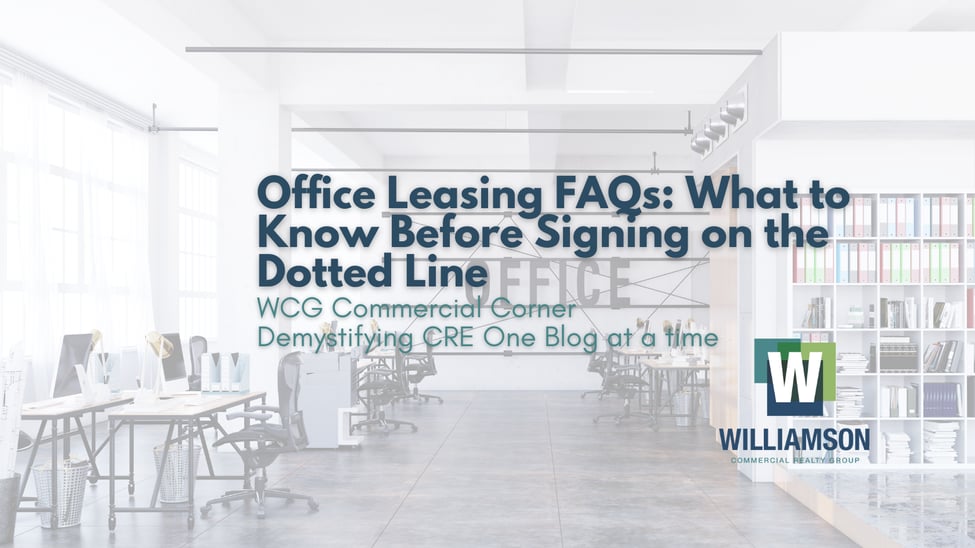Leasing office space can feel like entering a long-term relationship with a building. It starts off all shiny and full of potential… until you realize the fine print is 47 pages long and you don’t know what “TMI” means (and no, it's not too much information). If you’re considering office space in the Greater Toronto Area, or renegotiating your current lease, these are the most frequently asked questions we receive from tenants. If you're not asking them, you should be.
1. Lease Terms & Structure
What’s the typical lease term for office space?
Most office leases run 3 to 10 years. Some landlords may offer shorter or more flexible terms; however, the more leverage you have, the more flexibility you can negotiate.
Gross lease vs. net lease, what’s the deal?
Gross Lease: You pay a flat rent. The landlord covers operating costs.
Net Lease: You pay base rent plus your share of TMI (Taxes, Maintenance, Insurance).
Can I negotiate my lease terms?
Yes. And you should. Think rent, lease term, renewal options, tenant improvement allowance (TIA), free rent periods, and caps on operating costs.
What if I need to break the lease early?
That’s when it gets expensive, unless you’ve built in a termination clause, sublease rights, or buyout option. Don’t assume you're stuck, and don’t skip this conversation up front.
Can I grow or shrink my space if things change?
Some leases have expansion or contraction rights worked in; but only if you negotiate them before you sign. Afterward, you’re hoping for goodwill and availability.
2. Costs & Financial Considerations
What other costs should I expect beyond base rent?
TMI (Taxes, Maintenance, Insurance)
Utilities & janitorial services
Parking fees
Security and IT infrastructure
Will my rent go up every year?
Almost always. Expect 2 - 5% annual increases or adjustments based on CPI (Consumer Price Index).
What is a tenant improvement allowance (TIA)?
TIA is the landlord’s way of helping you customize the space. It can be a cash incentive or built into your rent in a variety of different ways. How it’s structured does affect your deal.
Any hidden fees I should watch for?
Yes, like admin fees, capital costs, and vague operating expense increases. This is where a good advisor earns their stripes (and saves you serious money).
3. Space & Operational Considerations
What’s the difference between usable and rentable square footage?
Usable SF: Your actual, exclusive space.
Rentable SF: Includes common areas like lobbies and washrooms. You’ll pay based on rentable SF even if your team never sets foot in the hallway.
What is a load factor?
It's the markup on space you don't occupy. For example, a 20% load factor means your rent is based on 20% more space than you actually use. It's standard and it can be negotiable in some cases.
Can I make changes to the office space?
Usually yes, but only with landlord approval. Also watch for restoration clauses you might need to return the space to vanilla white walls and gray carpet when you leave.
What amenities are included?
Could be anything from parking and shared kitchens to fitness centres and concierge services. Just remember: if it sounds too good to be true, the cost is probably buried in your TMI.
Who handles maintenance and repairs?
Generally speaking: (The Lease should clearly define all items of responsibility)
Landlord: Structure and common areas
Tenant: Everything inside your four walls
4. Moving In & Moving Out
How much notice do I need to give before leaving?
Usually 6 to 12 months before the lease ends. Miss that window and you’re either renewing by default or facing a holdover premium.
What if I stay past my lease end date?
You will trigger the holdover clause; which often means 150 - 200% rent increase until you vacate or sign a new deal. Painful.
Can I sublease if I don’t need the space anymore?
Most leases allow it, but the landlord has to approve the new tenant, and there may be restrictions.
What are my responsibilities when the lease ends?
Usually you are expected to return the space in “broom-clean” condition. In some cases, you’ll also have to remove your improvements and restore the original layout.
Leases are complicated. Don’t go it alone.
Office leases are full of nuance, legal landmines, and future costs you didn’t see coming unless you knew where to look. That’s where we come in, we make sure your lease protects your business, not just the landlord’s bottom line.
☕️ Let’s Talk. Before You Sign Anything.
If you’re about to lease, renegotiate, or bail on your office space call us before your landlord’s lawyer sends you 47 pages of regret. Your space should work for your business. We will make sure it does. Or, if you're shy and allergic to phone calls, send me a message. I’ll bring the lease decoder ring.
🔚 Final Thought:
Your lease isn’t just a formality. It’s a strategy.
If you don’t know what to ask, your landlord sure isn’t going to help you figure it out.
The landlord has a broker. So should you.
Because your lease isn’t just paperwork it’s profit protection.
I represent you like it's my name on the lease.
📩 [email protected]
🌐 williamsoncommercialrealty.com
Client Focused | Solution Driven | Commercial Realtors

